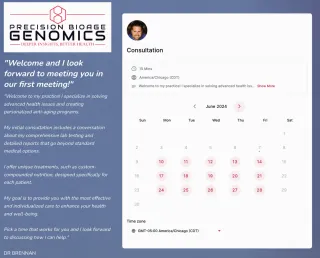Contact Us
(913) 404-2449
Follow Us:
Our Blogs
Lorem ipsum dolor sit amet, consectetuer adipiscing elit. Aenean commodo ligula eget dolor. Aenean massa. Cum sociis natoque penatibus et magnis dis parturient montes, nascetur ridiculus mus.

Crafting Your Path to Wellness: A Guide to Creating a Healthy Meal Plan
“Your Treatment Can Only Be As Good As The Data It Is Based ON, Your Life Is Only As Good As Your Treatment”
- Dr Brennan
Introduction:
Nutrition forms the foundation of health and vitality, serving as fuel for our bodies and minds. A well-balanced meal plan provides essential nutrients, supports energy levels, and promotes overall well-being. In this blog, we'll explore the principles of creating a healthy meal plan, including key components, strategies for balanced eating, and tips for success.

Understanding the Components of a Healthy Meal Plan:
1. Macronutrients: Every meal should include a balance of macronutrients, including carbohydrates, proteins, and fats, to provide energy, support muscle repair and growth, and regulate metabolic processes.
2 Micronutrients: Incorporate a variety of fruits, vegetables, whole grains, lean proteins, and healthy fats to ensure adequate intake of essential vitamins, minerals, and antioxidants, which are vital for overall health and disease prevention.
3 Fiber: Include plenty of fiber-rich foods, such as fruits, vegetables, whole grains, legumes, and nuts, to support digestive health, promote satiety, and regulate blood sugar levels.
4 Hydration: Drink plenty of water throughout the day and include hydrating foods, such as fruits and vegetables, to maintain proper hydration levels and support optimal bodily functions.
Strategies for Balanced Eating:
1 Plan Ahead: Take time to plan your meals for the week, considering your schedule, preferences, and nutritional needs. Create a shopping list based on your meal plan to ensure you have all the ingredients on hand.
2 Prioritize Whole Foods: Focus on incorporating whole, minimally processed foods into your meals, such as fruits, vegetables, whole grains, lean proteins, and healthy fats, while minimizing intake of processed and refined foods high in added sugars, sodium, and unhealthy fats
3 Practice Portion Control: Pay attention to portion sizes and serve appropriate portions of each food group to maintain balance and prevent overeating. Use visual cues, such as a quarter of your plate for protein, a quarter for carbohydrates, and half for vegetables, to guide portion sizes.
4 Eat Mindfully: Slow down and savor each bite, paying attention to hunger and fullness cues, and practicing mindful eating. Avoid distractions, such as screens or multitasking, while eating to enhance awareness and enjoyment of your meals.
5 Incorporate Variety: Aim for variety in your meals and snacks, incorporating different colors, textures, and flavors to ensure a diverse range of nutrients and promote enjoyment of eating.
6 Cook at Home: Prepare meals at home whenever possible, using fresh, whole ingredients and minimizing reliance on pre-packaged and restaurant foods, which tend to be higher in calories, sodium, and unhealthy fats.
Tips for Success:
1 tart Small: Begin by making small, sustainable changes to your eating habits, such as adding an extra serving of vegetables to your meals or swapping out sugary snacks for fresh fruit.
2 Be Flexible: Allow for flexibility in your meal plan and be willing to adapt based on changing circumstances, preferences, and cravings. Embrace imperfection and focus on progress, not perfection.
3 Listen to Your Body: Tune in to your body's hunger and fullness cues, and adjust your meal plan accordingly. Eat when you're hungry, stop when you're satisfied, and honor your body's signals.
4 Seek Support: Surround yourself with supportive friends, family, or online communities who share your health and wellness goals. Seek guidance from a registered dietitian or nutritionist for personalized advice and support.
Conclusion
Creating a healthy meal plan is a powerful step toward nourishing your body, supporting your health goals, and cultivating overall well-being. By prioritizing whole foods, balanced nutrition, and mindful eating practices, you can fuel your body with the nutrients it needs to thrive and enjoy a lifetime of health and vitality. Remember, a healthy meal plan is not about restriction or deprivation but about nourishing your body and embracing the joy of eating well
Start Your Personalized Journey Today
Ready to explore the benefits of DNA epigenetic and metabolic mapping? Book a consultation with us today and discover how these cutting-edge techniques can transform your health. Contact us at [contact information] or visit our website to schedule your appointment.
Frequently Asked Questions
How can I book a consultation?
Click HERE and you may schedule a time that is convenient.

How does Precision BioAge Genomics personalize treatment plans?
Precision BioAge Genomics personalizes treatment plans by utilizing genetic testing to identify individual genetic variations that impact health outcomes and treatment responses. They employ comprehensive panels like the Cardiac Health Panel and Gut Zoomer to gain a holistic view of health, integrating nutritional and lifestyle recommendations based on genetic results. Personalized supplementation is provided to address specific deficiencies and imbalances. Regular follow-up testing ensures the effectiveness of interventions and allows for adjustments to optimize treatment plans.

What types of advanced lab testing do you offer?
A detailed list of the various tests available, such as genetic, hormone, neurotransmitter, oxidation, food allergy/sensitivity, toxin, Lyme disease, cardiac, diabetes, and biological clock testing.

How does your testing process work?
In most situations, lab kits are usually shipped to your home, making it easy to collect your samples. Arrange for sample pickup using the provided number. After the samples are processed and reports are prepared, you'll have a Report of Findings with Dr. Brennan to discuss your health goals and the results.

Schedule Your Consultation With Dr Brennan
Ready to take control of your health? Book your Salivary Hormones Consult now.

Follow Us
Follow Us
© Copyright 2025. Company Name. All rights reserved.








